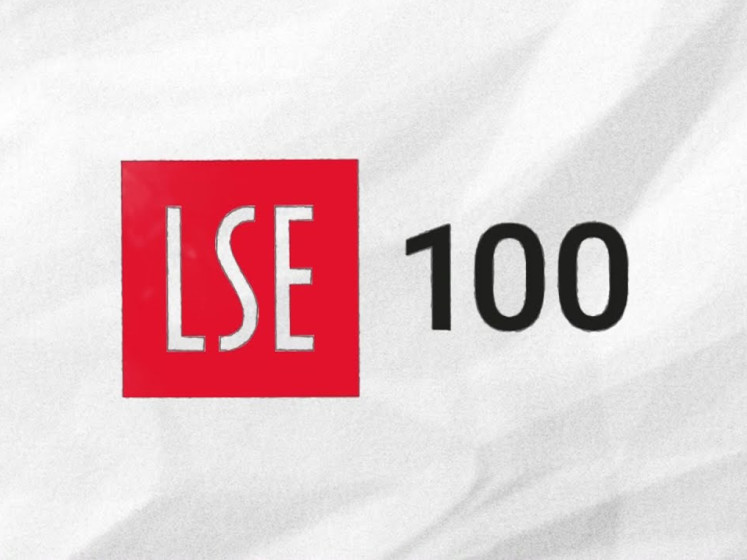LSE100 is LSE’s flagship interdisciplinary course taken by all first-year undergraduate students as part of your degree programme. The course is designed to build your capacity to tackle multidimensional problems through research-rich education, giving you the opportunity to explore transformative global challenges in collaboration with peers from other departments and leading academics from across the School.
In the video below, learn more about the course from LSE100's Co-Directors.
 An introduction to the course from the LSE100 Co-Directors
Dr Chris Blunt and Dr Jillian Terry (LSE100 Co-Directors) provide an introduction to the course.
An introduction to the course from the LSE100 Co-Directors
Dr Chris Blunt and Dr Jillian Terry (LSE100 Co-Directors) provide an introduction to the course.
In 2025/26, students will have the opportunity to select from one of three themes to focus on during LSE100, each of which foregrounds a complex and pressing question facing social scientists. The themes are:
The LSE100 Co-Directors, Dr Chris Blunt and Dr Jillian Terry, will be hosting online Ask the LSE100 Co-Directors sessions in August and September 2025, where undergraduate offer holders for 2025/26 can ask any questions that they may have about the course. You can find details of these sessions and how to attend here.
What can you expect from LSE100?
During your time on LSE100, you will learn about your chosen theme from a range of disciplinary perspectives, bringing your own subject knowledge and expertise to bear on the complex questions and challenges related to controlling the future of AI, averting a climate catastrophe, or creating a fair society.
No matter which theme you have chosen to focus on this year, LSE100 is a single course and all three themes are highly interrelated. Climate catastrophe is affected by developments in AI and has huge implications for fairness in society, the rapid growth in AI technologies is already having an impact on socialine qualities as well as environments across the world, and our conceptions of a fair society can only be properly understood in the context of technological and environmental changes.Throughout the year, you will have a range of opportunities to connect with the other themes of the course, whether through activities in LSE100 seminars, your choice of assessment topics, or our interdisciplinary events programme.
In addition, all students on LSE100 will learn to use the tools and frameworks of systems thinking and you will employ these approaches to analyse the complexities within your chosen theme. Systems thinking and system change approaches are widely used across a range of different sectors – developing your skills with these frameworks will broaden your intellectual experience and deepen your understanding of your own discipline as you test theories, evidence and ideas from different disciplinary perspectives. Regardless of which theme you choose, LSE100 will help you develop skills in persuasive academic argumentation, communication for diverse audiences, and effective collaboration and teamwork that you will use in your other courses as well as in your professional life.

How will you study LSE100?
LSE100 is a half unit running across Autumn and Winter term in the first year of all undegraduate students' degree programmes.
Each term, you will attend five 90-minute interactive, discussion-based seminars in alternating weeks. Before each seminar, you will use Moodle to watch two short videos featuring leading LSE academics, each around 10 minutes in length. You will also complete 1-2 short readings totalling no more than 20 pages.
Videos and readings are accessed through LSE100’s Moodle page (LSE username and password required), and are displayed in a lesson format, presented sequentially with accompanying notes and guiding questions.
As your group project progresses, you and your group members will prepare for each seminar by completing arange of tasks and choosing readings which relate to your group project topic.
How will I be assessed?
Your LSE100 mark will be based on two summative assessments:
- One individual written assessment (50%) in the Autumn Term
- One group research project (50%) that you will complete collaboratively as a team of 4-5 students in the Winter Term. The project includes two components: a 10-minute group presentation to be delivered during one of your LSE100 seminars, and a digital report submitted at the end of term.
The LSE100 Moodle page (LSE username and password required) contains all the information you need to complete both assessments, including detailed assessment guidance, marking criteria, and recommended resources. Your teacher will discuss each assessment in more detail in your seminars.
Learning how to evaluate evidence, how to assess positions and to think critically, how to structure arguments and how to argue persuasively orally and in writing are all part of the course. A full list of the LSE100 learning outcomes can be viewed here.
How will LSE100 complement your degree program?
LSE100 gives all undergraduates the chance to explore new ideas and analytical approaches in a collaborative, intellectually challenging, and supportive environment. This course is an opportunity for you to take risks, work closely with people from very different disciplinary backgrounds, and learn about perspectives that diverge from those you are likely to encounter in your degree programme.
In addition to broadening your intellectual experience at the School, LSE100 will help you develop some of the key practical skills and intellectual creativity that will help you succeed in whatever path you might choose professionally. Employers are looking for graduates who can think creatively, analyse complex problems, deliver compelling presentations, and interact with a wide range of audiences. They want mathematicians who can also write a persuasive report, historians who can also create graphical representations of data, and most of all, employees who can talk to clients and partners all over the world with confidence. LSE100 is designed to ensure that an LSE education provides graduates with distinctive skills that cut across specialist subject areas.
